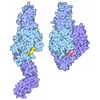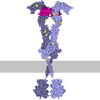[English] 日本語
 Yorodumi
Yorodumi- PDB-3h32: Crystal structure of D-dimer from human fibrin complexed with Gly... -
+ Open data
Open data
- Basic information
Basic information
| Entry | Database: PDB / ID: 3h32 | |||||||||
|---|---|---|---|---|---|---|---|---|---|---|
| Title | Crystal structure of D-dimer from human fibrin complexed with Gly-His-Arg-Pro-Tyr-amide | |||||||||
 Components Components |
| |||||||||
 Keywords Keywords | BLOOD CLOTTING / fibrinogen / fibrin clots / Amyloid / Amyloidosis / Blood coagulation / Disease mutation / Disulfide bond / Glycoprotein / Isopeptide bond / Phosphoprotein / Secreted / Pyrrolidone carboxylic acid / Sulfation / cDNA FLJ75335 / transcript variant gamma-A / mRNA / isoform CRA_m | |||||||||
| Function / homology |  Function and homology information Function and homology informationblood coagulation, common pathway / induction of bacterial agglutination / fibrinogen complex / Regulation of TLR by endogenous ligand / platelet alpha granule / blood coagulation, fibrin clot formation / cellular response to leptin stimulus / MyD88 deficiency (TLR2/4) / positive regulation of heterotypic cell-cell adhesion / IRAK4 deficiency (TLR2/4) ...blood coagulation, common pathway / induction of bacterial agglutination / fibrinogen complex / Regulation of TLR by endogenous ligand / platelet alpha granule / blood coagulation, fibrin clot formation / cellular response to leptin stimulus / MyD88 deficiency (TLR2/4) / positive regulation of heterotypic cell-cell adhesion / IRAK4 deficiency (TLR2/4) / extracellular matrix structural constituent / MyD88:MAL(TIRAP) cascade initiated on plasma membrane / plasminogen activation / p130Cas linkage to MAPK signaling for integrins / positive regulation of peptide hormone secretion / positive regulation of vasoconstriction / GRB2:SOS provides linkage to MAPK signaling for Integrins / protein secretion / positive regulation of exocytosis / protein polymerization / cellular response to interleukin-1 / Integrin cell surface interactions / negative regulation of endothelial cell apoptotic process / Common Pathway of Fibrin Clot Formation / negative regulation of extrinsic apoptotic signaling pathway via death domain receptors / fibrinolysis / cell adhesion molecule binding / Integrin signaling / positive regulation of substrate adhesion-dependent cell spreading / platelet alpha granule lumen / cell-matrix adhesion / positive regulation of protein secretion / Post-translational protein phosphorylation / Signaling by high-kinase activity BRAF mutants / response to calcium ion / MAP2K and MAPK activation / platelet aggregation / Regulation of Insulin-like Growth Factor (IGF) transport and uptake by Insulin-like Growth Factor Binding Proteins (IGFBPs) / Signaling by RAF1 mutants / Signaling by moderate kinase activity BRAF mutants / Paradoxical activation of RAF signaling by kinase inactive BRAF / Signaling downstream of RAS mutants / Signaling by BRAF and RAF1 fusions / Platelet degranulation / extracellular vesicle / protein-folding chaperone binding / : / ER-Phagosome pathway / protein-containing complex assembly / cell cortex / protein-macromolecule adaptor activity / blood microparticle / adaptive immune response / positive regulation of ERK1 and ERK2 cascade / endoplasmic reticulum lumen / Amyloid fiber formation / signaling receptor binding / innate immune response / external side of plasma membrane / synapse / structural molecule activity / cell surface / endoplasmic reticulum / extracellular space / extracellular exosome / extracellular region / metal ion binding / plasma membrane Similarity search - Function | |||||||||
| Biological species |  Homo sapiens (human) Homo sapiens (human) | |||||||||
| Method |  X-RAY DIFFRACTION / X-RAY DIFFRACTION /  SYNCHROTRON / SYNCHROTRON /  MOLECULAR REPLACEMENT / Resolution: 3.6 Å MOLECULAR REPLACEMENT / Resolution: 3.6 Å | |||||||||
 Authors Authors | Doolittle, R.F. / Pandi, L. | |||||||||
 Citation Citation |  Journal: Biochemistry / Year: 2009 Journal: Biochemistry / Year: 2009Title: Two families of synthetic peptides that enhance fibrin turbidity and delay fibrinolysis by different mechanisms. Authors: Pandi, L. / Kollman, J.M. / Lopez-Lira, F. / Burrows, J.M. / Riley, M. / Doolittle, R.F. | |||||||||
| History |
|
- Structure visualization
Structure visualization
| Structure viewer | Molecule:  Molmil Molmil Jmol/JSmol Jmol/JSmol |
|---|
- Downloads & links
Downloads & links
- Download
Download
| PDBx/mmCIF format |  3h32.cif.gz 3h32.cif.gz | 299.1 KB | Display |  PDBx/mmCIF format PDBx/mmCIF format |
|---|---|---|---|---|
| PDB format |  pdb3h32.ent.gz pdb3h32.ent.gz | 232.8 KB | Display |  PDB format PDB format |
| PDBx/mmJSON format |  3h32.json.gz 3h32.json.gz | Tree view |  PDBx/mmJSON format PDBx/mmJSON format | |
| Others |  Other downloads Other downloads |
-Validation report
| Summary document |  3h32_validation.pdf.gz 3h32_validation.pdf.gz | 1.3 MB | Display |  wwPDB validaton report wwPDB validaton report |
|---|---|---|---|---|
| Full document |  3h32_full_validation.pdf.gz 3h32_full_validation.pdf.gz | 1.4 MB | Display | |
| Data in XML |  3h32_validation.xml.gz 3h32_validation.xml.gz | 61.3 KB | Display | |
| Data in CIF |  3h32_validation.cif.gz 3h32_validation.cif.gz | 83.6 KB | Display | |
| Arichive directory |  https://data.pdbj.org/pub/pdb/validation_reports/h3/3h32 https://data.pdbj.org/pub/pdb/validation_reports/h3/3h32 ftp://data.pdbj.org/pub/pdb/validation_reports/h3/3h32 ftp://data.pdbj.org/pub/pdb/validation_reports/h3/3h32 | HTTPS FTP |
-Related structure data
| Related structure data |  1fzeS S: Starting model for refinement |
|---|---|
| Similar structure data |
- Links
Links
- Assembly
Assembly
| Deposited unit | 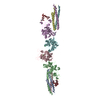
| ||||||||
|---|---|---|---|---|---|---|---|---|---|
| 1 |
| ||||||||
| Unit cell |
| ||||||||
| Details | D-DIMER IS COMPOSED OF TWO (IDENTICAL) THREE-CHAINED MOIETIES CROSS-LINKED NEAR THE CARBOXYL-TERMINI OF THE GAMMA CHAINS. |
- Components
Components
-Protein , 3 types, 6 molecules ADBECF
| #1: Protein | Mass: 22771.676 Da / Num. of mol.: 2 / Fragment: UNP residues 20-216 / Source method: isolated from a natural source / Source: (natural)  Homo sapiens (human) / Tissue: blood plasma / References: UniProt: P02671 Homo sapiens (human) / Tissue: blood plasma / References: UniProt: P02671#2: Protein | Mass: 52026.066 Da / Num. of mol.: 2 / Fragment: UNP residues 31-488 / Source method: isolated from a natural source / Source: (natural)  Homo sapiens (human) / Tissue: blood plasma / References: UniProt: P02675 Homo sapiens (human) / Tissue: blood plasma / References: UniProt: P02675#3: Protein | Mass: 35817.645 Da / Num. of mol.: 2 / Fragment: UNP residues 27-437 / Source method: isolated from a natural source / Source: (natural)  Homo sapiens (human) / Tissue: blood plasma / References: UniProt: P02679 Homo sapiens (human) / Tissue: blood plasma / References: UniProt: P02679 |
|---|
-Protein/peptide / Sugars / Non-polymers , 3 types, 8 molecules MN

| #4: Protein/peptide | Mass: 630.696 Da / Num. of mol.: 2 / Fragment: UNP residues 22-26 / Source method: obtained synthetically Details: Synthetic peptide based on the bovine (Bos taurus) Fibrinopeptide B, P02676, FIBB_BOVIN, sequence position 22-26 References: UniProt: P02676 #5: Polysaccharide | Source method: isolated from a genetically manipulated source #6: Chemical | ChemComp-CA / |
|---|
-Details
| Has protein modification | Y |
|---|
-Experimental details
-Experiment
| Experiment | Method:  X-RAY DIFFRACTION / Number of used crystals: 1 X-RAY DIFFRACTION / Number of used crystals: 1 |
|---|
- Sample preparation
Sample preparation
| Crystal | Density Matthews: 3.22 Å3/Da / Density % sol: 61.85 % |
|---|---|
| Crystal grow | Temperature: 295 K / Method: vapor diffusion, sitting drop / pH: 7.5 Details: Equal volumes of (a) 5 mg/mL D-dimer, 0.5 mM GHRPYam, 0.3 mM GPRPam, 0.05 M Tris-HCl pH 8.0 and (b) 1% PEG 3350, 1 mM Iodoacetamide, 1 mM CaCl2, 2mM Sodium azide, VAPOR DIFFUSION, SITTING DROP, temperature 295K |
-Data collection
| Diffraction | Mean temperature: 100 K |
|---|---|
| Diffraction source | Source:  SYNCHROTRON / Site: SYNCHROTRON / Site:  ALS ALS  / Beamline: 5.0.3 / Wavelength: 1 Å / Beamline: 5.0.3 / Wavelength: 1 Å |
| Detector | Type: ADSC QUANTUM 315 / Detector: CCD / Date: Oct 21, 2007 |
| Radiation | Monochromator: Si(220) / Protocol: SINGLE WAVELENGTH / Monochromatic (M) / Laue (L): M / Scattering type: x-ray |
| Radiation wavelength | Wavelength: 1 Å / Relative weight: 1 |
| Reflection | Resolution: 3.6→50 Å / Num. all: 33100 / Num. obs: 31584 / % possible obs: 95 % / Observed criterion σ(F): 1 / Observed criterion σ(I): 1 / Redundancy: 3.6 % / Rsym value: 0.073 |
- Processing
Processing
| Software |
| |||||||||||||||||||||||||||||||||||
|---|---|---|---|---|---|---|---|---|---|---|---|---|---|---|---|---|---|---|---|---|---|---|---|---|---|---|---|---|---|---|---|---|---|---|---|---|
| Refinement | Method to determine structure:  MOLECULAR REPLACEMENT MOLECULAR REPLACEMENTStarting model: PDB entry 1FZE Resolution: 3.6→50 Å / Cross valid method: THROUGHOUT
| |||||||||||||||||||||||||||||||||||
| Refinement step | Cycle: LAST / Resolution: 3.6→50 Å
| |||||||||||||||||||||||||||||||||||
| Refine LS restraints |
| |||||||||||||||||||||||||||||||||||
| LS refinement shell |
|
 Movie
Movie Controller
Controller


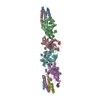

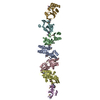

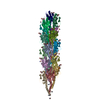




 PDBj
PDBj

